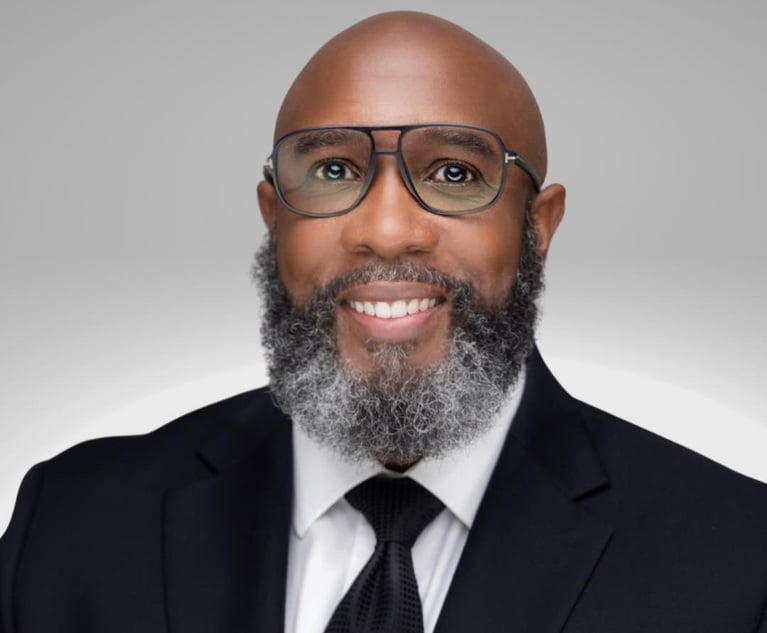How 3 Years of Isolation Made Weiss Serota's Anthony Recio a Better Lawyer
Coral Gables attorney Anthony "Tony" Recio spent three years and five months at a Buddhist retreat, with no phone, internet or television.
April 17, 2020 at 02:38 PM
7 minute read
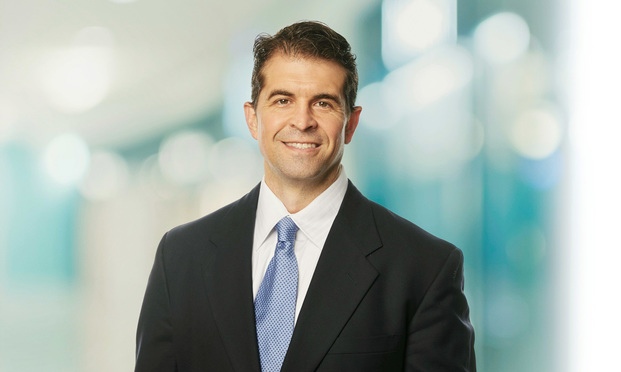 Anthony Recio, Weiss Serota Helfman Cole & Bierman in Coral Gables. Courtesy photo.
Anthony Recio, Weiss Serota Helfman Cole & Bierman in Coral Gables. Courtesy photo.
After more than three years in a Buddhist retreat almost entirely cut off from the outside world, Weiss Serota Helfman Cole & Bierman Miami partner Anthony "Tony" Recio is back.
And of the "several little surprises" to which he returned—a global pandemic—takes the cake.
"No one expected this," Recio said. "But in some ways, I guess I jumped from one socially distanced setting to another."
While taking a sabbatical had long been on Recio's bucket list, "someday" suddenly became "now or never" when a spot opened at a retreat in Wappingers Falls, New York, beginning Sept. 30, 2016, and ending Feb. 23, 2020.
Recio had to make a quick decision: "OK. Let's do this," he said.
But first, he had to tell his bosses, who were shocked, but supportive.
"I think any good boss's primary goal is for the people under them to thrive in whatever circumstance they are in. And I was very fortunate to have such good bosses and partners—all of them," Recio said. "But it was still hard, because it's hard to say goodbye after so much history, and for such a long time."
Recio said farewell to his wife, colleagues, friends and family, and hello to a structured, cloistered and quiet existence.
For the next three years and five months, he lived monastically, with no phone, internet or television. Loved ones could write letters and a few caretaking staff would drop by, but that was it.
"There is a short period of time each day, or most days, where there's a little bit of talking involved," Recio said. "But the rest of the time it's silent, and you're dedicating your time and your energy to meditation."
Homesickness was a frequent reality, according to Recio, who said four of 10 people had left by the end. When tempted to leave, he'd remind himself: "I did this for a reason, and I have already upended my life. Let's try another day. One more day."
Recio was the sole lawyer in a diverse bunch, comprising a Japanese pilot, a Brazilian-Japanese monk, a Polish-American designer, a former cataloger at the Shakespeare Library in Washington, D.C., a Colombian student and a university art teacher from South Florida.
Having many different perspectives all in one place meant "when we could talk, there was plenty of healthy debate."
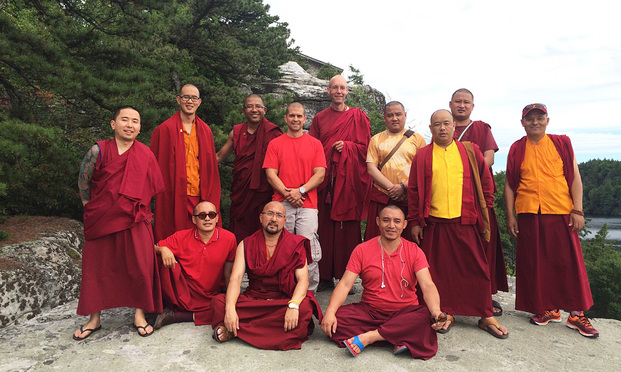 Anthony Recio, attoney with Weiss Serota Helfman Cole & Bierman in Coral Gables, 4th from left, standing, at a Buddhist retreat. Courtesy photo.
Anthony Recio, attoney with Weiss Serota Helfman Cole & Bierman in Coral Gables, 4th from left, standing, at a Buddhist retreat. Courtesy photo.'I think the guy won'
A Peruvian cook catered for the group during the first few months — while a presidential election went on outside. The cook wasn't into U.S. politics, but without Siri, he was the only person the group could ask about the results.
"We knew when election day was. So we asked him in that period where we could talk, we asked him the day after, 'Hey, who won?' And he said something like, 'I don't know. I think the guy won,' " Recio said. " Our first reaction was, 'No, he doesn't know what he's talking about. That can't be possible.' I guess we were wrong."
Recio eventually got clarification through the mail.
"It was really sad to hear how people were talking about politics with such a level of divisiveness," Recio said. "Because wherever you stand on the political spectrum, it's just rough to see a country divided like that, to see families divided in certain instances. I think that needs to be healed in the long term, hopefully sooner, rather than later."
When Recio got home, he was amazed at how the nature of television had changed.
"The first time my mother-in-law showed me there were no channels, instead there's Netflix, Amazon Prime. 'What?' " Recio said. " And then you've got to scroll through a million different options to scroll through what you don't necessarily want to watch anyway. That was kind of surprising."
Recio became a Buddhist in 2010, when he discovered a love for meditation practice. The goal is enlightenment, but the process of getting there is considered just as important.
Recio's favorite side effect: "less reactivity, more perspective."
Missing stress
After a while, Recio said his brain craved the challenges of lawyering — something he now feels better equipped to handle.
"I really missed the people. I missed the problem solving. I missed, believe it or not, the stress," Recio said. "There's a certain energy that is generated by our minds and bodies when we're under stress, and that can be debilitating if not channeled correctly, but if it is channeled skillfully, it can be invigorating."
Recio joined Weiss Serota as a summer associate in law school when he was able to learn complex land use codes freakishly fast, according to office managing director Mitchell Bierman. He says Recio's "humble," "zen and elegant" style of practice has been invaluable.
"You see some really good land-use lawyers out there who are really aggressive, and they pound their chest and they get results," Bierman said. "But Tony gets better results by being very nonaggressive. It's almost like he lets the city come to the right conclusion on their own, and he just gently guides them there."
When managers were considering pay rises one year, Bierman said Recio asked that any increase go to a newer land-use lawyer instead of him.
"Nobody else has ever said that," Bierman said.
When Bierman heard Recio was leaving, he couldn't believe it — until they spoke.
"At the end of the conversation, he'd convinced me that it was the only reasonable decision that he could possibly make," Bierman said. "I knew he was doing that in order to gain clarity that very few people have, and I believe he succeeded. I got to enjoy the process with him through his letters."
At work, Recio finds win-win scenarios, advancing client interests without trampling others. But with a sea of opinions sprouting from every project, that's not easy.
Recio helped Pinnacle Housing Group build Miami's first mixed-income building and steered MDM Development Group through the discovery of a prehistoric Native-American site in the midst of its $1 billion Metropolitan Miami project. Thanks to an agreement with native groups, the development will include museum exhibits.
University of Miami law professor Scott Rogers said he never expected to hear Recio say, "I'm going to go away for three years," when they met for coffee in 2016. But the resulting journey was inspiring, from where he was sitting.
"When I received a letter from him, I wouldn't just open it, I would put it aside. It was like a gift that I wanted to savor," Rogers said. "He embodies both the firmness of conviction and the ability to say and do what needs to be done because it's what's called for, and yet do it in a way that is openhearted and kind."
Rogers met Recio while assembling a mindfulness-in-law task force for the Dade County Bar Association and South Florida's Federal Bar Association — something Recio hopes to pick back up.
"If I can help people learn ways and methods to better cope with stress, maybe we can have happier, more gentile lawyers and better serve our clients," Recio said. "I think all that is something that's worth striving for, and I would like to be a part of that."
Anthony L. Recio
Born: November 1976, Miami
Spouse: Shamelle Gonzalez
Education: University of Miami, J.D., 2001; B.S., 1998
Experience: Partner, Weiss Serota Helfman & Bierman, 2010-present; Associate, 2001-2009
More profiles:
Before Miami Lawyer Joel Eaton Was an Appellate Giant, He Was a Fighter Pilot
Fearless Miami Prosecutor Barbara Martinez is at Home at Holland & Knight
This content has been archived. It is available through our partners, LexisNexis® and Bloomberg Law.
To view this content, please continue to their sites.
Not a Lexis Subscriber?
Subscribe Now
Not a Bloomberg Law Subscriber?
Subscribe Now
NOT FOR REPRINT
© 2025 ALM Global, LLC, All Rights Reserved. Request academic re-use from www.copyright.com. All other uses, submit a request to [email protected]. For more information visit Asset & Logo Licensing.
You Might Like
View All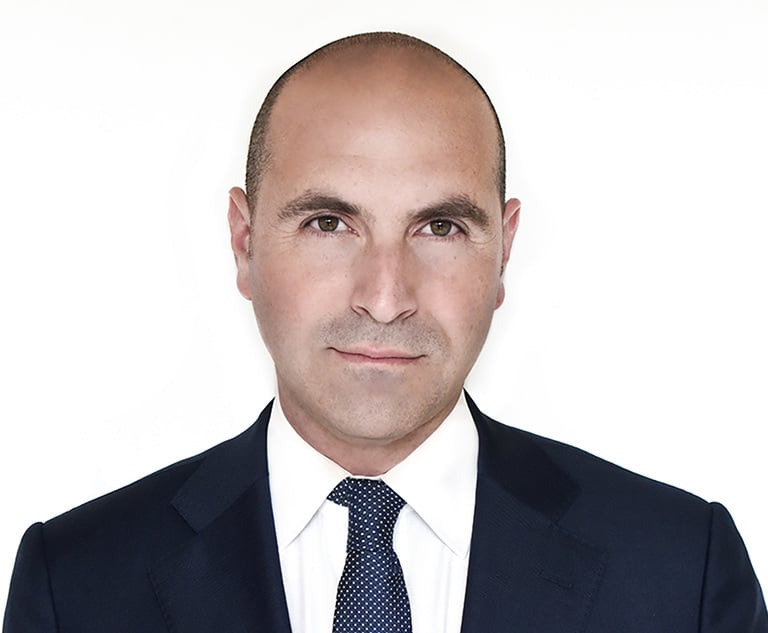
Growing Referral Network, Alternative Fees Have This Ex-Big Law’s Atty’s Bankruptcy Practice Soaring
5 minute read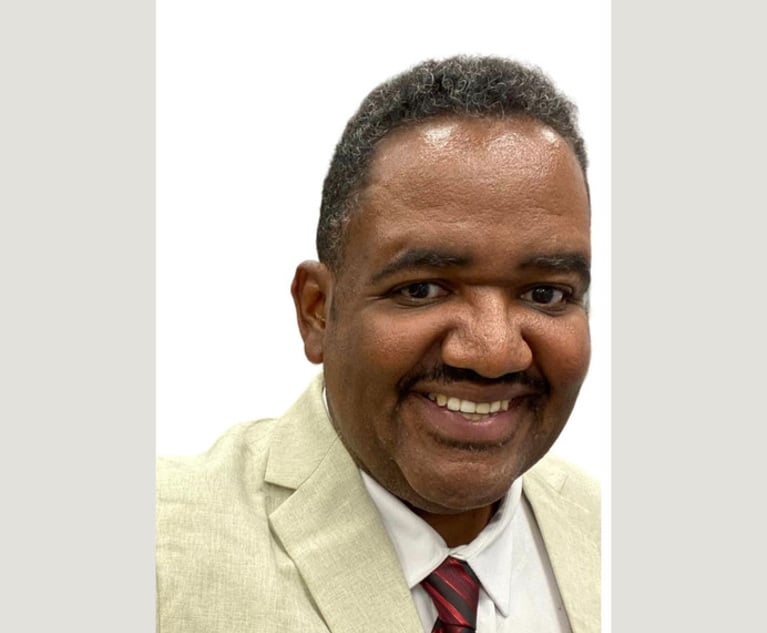
Against the Odds: Voters Elect Woody Clermont to the Broward Judicial Bench
4 minute read
Miami Civil Judge Myriam Lehr to Say Goodbye to the County Court Bench
4 minute readLaw Firms Mentioned
Trending Stories
- 1Public Notices/Calendars
- 2Wednesday Newspaper
- 3Decision of the Day: Qui Tam Relators Do Not Plausibly Claim Firm Avoided Tax Obligations Through Visa Applications, Circuit Finds
- 4Judicial Ethics Opinion 24-116
- 5Big Law Firms Sheppard Mullin, Morgan Lewis and Baker Botts Add Partners in Houston
Who Got The Work
J. Brugh Lower of Gibbons has entered an appearance for industrial equipment supplier Devco Corporation in a pending trademark infringement lawsuit. The suit, accusing the defendant of selling knock-off Graco products, was filed Dec. 18 in New Jersey District Court by Rivkin Radler on behalf of Graco Inc. and Graco Minnesota. The case, assigned to U.S. District Judge Zahid N. Quraishi, is 3:24-cv-11294, Graco Inc. et al v. Devco Corporation.
Who Got The Work
Rebecca Maller-Stein and Kent A. Yalowitz of Arnold & Porter Kaye Scholer have entered their appearances for Hanaco Venture Capital and its executives, Lior Prosor and David Frankel, in a pending securities lawsuit. The action, filed on Dec. 24 in New York Southern District Court by Zell, Aron & Co. on behalf of Goldeneye Advisors, accuses the defendants of negligently and fraudulently managing the plaintiff's $1 million investment. The case, assigned to U.S. District Judge Vernon S. Broderick, is 1:24-cv-09918, Goldeneye Advisors, LLC v. Hanaco Venture Capital, Ltd. et al.
Who Got The Work
Attorneys from A&O Shearman has stepped in as defense counsel for Toronto-Dominion Bank and other defendants in a pending securities class action. The suit, filed Dec. 11 in New York Southern District Court by Bleichmar Fonti & Auld, accuses the defendants of concealing the bank's 'pervasive' deficiencies in regards to its compliance with the Bank Secrecy Act and the quality of its anti-money laundering controls. The case, assigned to U.S. District Judge Arun Subramanian, is 1:24-cv-09445, Gonzalez v. The Toronto-Dominion Bank et al.
Who Got The Work
Crown Castle International, a Pennsylvania company providing shared communications infrastructure, has turned to Luke D. Wolf of Gordon Rees Scully Mansukhani to fend off a pending breach-of-contract lawsuit. The court action, filed Nov. 25 in Michigan Eastern District Court by Hooper Hathaway PC on behalf of The Town Residences LLC, accuses Crown Castle of failing to transfer approximately $30,000 in utility payments from T-Mobile in breach of a roof-top lease and assignment agreement. The case, assigned to U.S. District Judge Susan K. Declercq, is 2:24-cv-13131, The Town Residences LLC v. T-Mobile US, Inc. et al.
Who Got The Work
Wilfred P. Coronato and Daniel M. Schwartz of McCarter & English have stepped in as defense counsel to Electrolux Home Products Inc. in a pending product liability lawsuit. The court action, filed Nov. 26 in New York Eastern District Court by Poulos Lopiccolo PC and Nagel Rice LLP on behalf of David Stern, alleges that the defendant's refrigerators’ drawers and shelving repeatedly break and fall apart within months after purchase. The case, assigned to U.S. District Judge Joan M. Azrack, is 2:24-cv-08204, Stern v. Electrolux Home Products, Inc.
Featured Firms
Law Offices of Gary Martin Hays & Associates, P.C.
(470) 294-1674
Law Offices of Mark E. Salomone
(857) 444-6468
Smith & Hassler
(713) 739-1250





